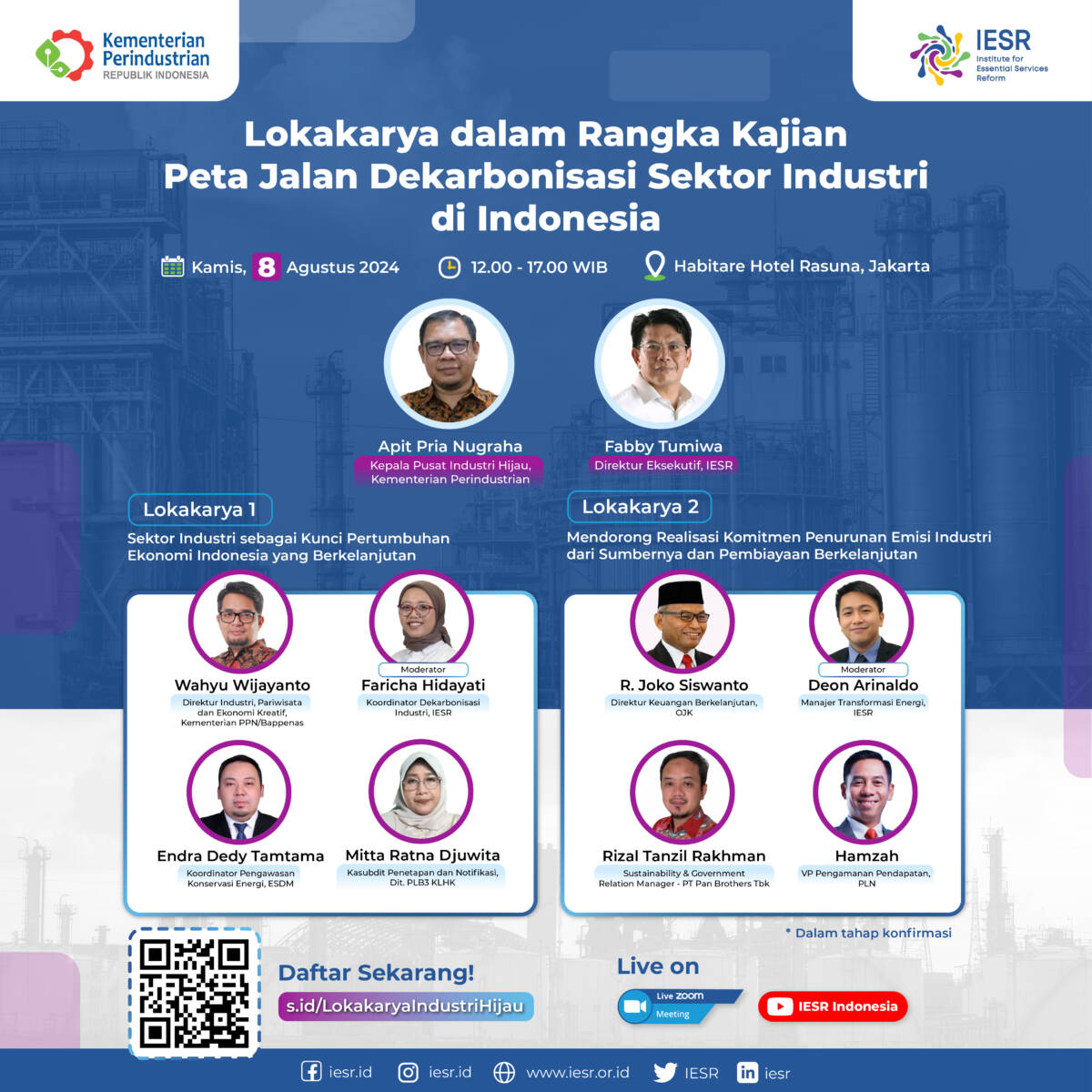
Workshop and Cluster Group Discussion on Determining the Direction of Industrial Decarbonization in the Framework of the Study of Industrial Decarbonization Roadmap in Indonesia
Background
The manufacturing sector is a key player in Indonesia’s economic growth. In 2022, the manufacturing sector contributed 16.5% of Indonesia’s Gross Domestic Product. The manufacturing sector is also a labor-intensive industry that is able to absorb a lot of labor and is classified as a resilient sector. This can be seen from the number of workers in 2022 which reached more than 19 million people, or around 14% of the number of national workers and the sector’s fairly stable growth in the last three years despite being hit by the COVID19 global pandemic and quite dynamic international geo-political conditions. Along with the hope of improving global conditions and the national economy, the Ministry of Industry targets the growth of the non-oil and gas processing industry in 2024 at 5.80 percent, or an increase of almost 1% compared to the previous year.
The growth of the industrial sector has a major impact on the amount of emissions produced. Based on the Indonesia Energy Transition Outlook 2024 report, industrial sectoral emissions in 2022 are estimated to increase by 30% from the previous year due to an increase in the amount of energy consumption by 5% to 71%. This significant increase was triggered by the use of fossil fuel-based energy sources, which are still the main choice of the industrial sector due to their relatively more affordable price. Other major emission contributors were industrial processes and product use at 12% and waste at 17%. When projected forward with the country’s development needs towards the Golden Indonesia of 2045, it is estimated that the amount of industrial sector emissions will almost double by that year. As a consequence, it will be difficult for Indonesia to help keep the earth’s temperature rise at a maximum of 1.5-2oC higher than the pre-industrial era. In response, Indonesia updated its climate commitment to be more ambitious through the Enhanced Nationally Determined Contribution (E-NDC) document. The reduction target by own efforts is increased from 29% to 31.89% and the reduction target with international assistance is increased from 41% to 43.20%. In addition, through the document, Indonesia also committed to achieving net zero emissions by 2060 or sooner.
In supporting the national priority program, the Ministry of Industry is currently working with the Institute for Essential Services Reform (IESR) and WRI Indonesia to conduct a study to build a decarbonization road map for 9 priority industries that is more adaptive, sustainable, and equitable. The nine industries are cement, iron and steel, pulp and paper, chemical (ammonia and non-ammonia), textile, food and beverage, transportation/automotive, and ceramic and glass industries, which accumulatively consume 39.1% of the total national energy consumption.
In order for the implementation of the decarbonization roadmap to go well, it is necessary to map opinions and inputs from key stakeholders such as industry players, industry and business associations, government, and financial institutions. That way, the decarbonization roadmap for the 9 priority industries will be in line with the capabilities and development potential of industry players, as well as in line with economic development targets and national emission reductions. Especially for industries with relatively moderate specific energy consumption, such as the textile industry, transport/automotive equipment, food and beverage, and ceramics and glass, a comprehensive initial mapping is needed so that the target setting is more targeted.
Objective
The activity, which targeted four industries with medium specific energy consumption, had five main objectives, as follows:
- To gather knowledge about the direction of industrial sector development in supporting the target of Indonesia Emas 2045,
- Gathering knowledge about the main production processes as well as energy, water and environmental management efforts at the sub-sectoral to entity level,
- Collect financing opportunities available to the industry in implementing sustainable efforts,
- Present the latest analysis and preliminary findings from the development of the decarbonization roadmap and gather feedback, and
- Identify challenges, opportunities and stakeholder support for industry decarbonization.
Presentation
Strategic Steps to Realize the Industry Net Zero Emissions Target 2050 – Faricha Hidayati IESR
Langkah-Strategis-Mewujudkan-Target-Industry-Net-Zero-Emissions-2050-Faricha-Hidayati-IESRConservation Policy in the Industrial Sector – KESDM
Kebijakan-Konservasi-di-Sektor-Industri-KESDMB3 and Non-B3 Waste Management Policy for the Industrial Sector – KLHK
Kebijakan-Pengelolaan-Limbah-B3-dan-Non-B3-untuk-Sektor-Industri-KLHKPLN’s Efforts to Support Energy Transition and Rooftop Solar Power Plant Growth – PLN Indonesia
Upaya-PLN-Dalam-Mendukung-Transisi-Energi-dan-Pertumbuhan-PLTS-Atap-PLN-IndonesiaDevelopment of the Industrial Sector in the RPJMN and RPJPN Towards a Sustainable Golden Indonesia 2045 – Bappenas
Pengembangan-Sektor-Industri-dalam-RPJMN-dan-RPJPN-Menuju-Indonesia-Emas-2045-yang-berkelanjutan-BappenasDecarbonization Program – PAN Brothers
Decarbonization-Program-PAN-BrothersHourly Schedule
Day 1
Speakers
-
Fabby Tumiwa - Chief Executive Officer (CEO) - IESR
-
Deon Arinaldo - Manajer Program System Energy Transformation IESR
-
Dr. Farid Wijaya - Senior Analyst in Materials and Renewable Energy IESR
-
Apit Pria Nugraha - Kepala Pusat Industri Hijau
-
Faricha Hidayati - Industry Decarbonization Policy and Technology Coordinator - IESR

